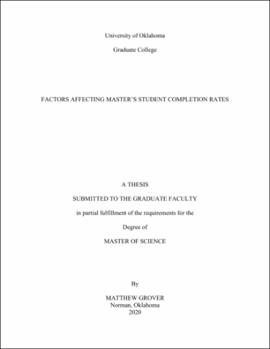Factors Affecting Master's Student Completion Rates
Abstract
Engineering master’s education is an understudied area in research. This lack of research has important ramifications to institutions, students, and society at large. Lower completion rates mean fewer qualified engineers available and a financial loss to both student and institutions. This has a society-wide impact and is important to address. As the number of students enrolled in master’s programs continues to grow, it becomes critical to review, identify, and discuss factors that affect degree completion. Improvements to completion rates cannot be made and maintained without a detailed and nuanced understanding of the underlying factors. This study investigated engineering master’s completion rates for students entering a large midwestern research institution from fall 2009 to spring 2014 (N=485) to identify factors affecting completion rates. Using logistic regression this study found that graduate GPA, funding, full-time enrollment, and summer enrollment affected completion rates. This study also found that prior undergraduate experience at the institution did not affect completion rates. This study also reports and compares completion rates for engineering master’s programs from prior literature. Future research and policy ramifications are discussed.
Collections
- OU - Theses [2117]
The following license files are associated with this item:

